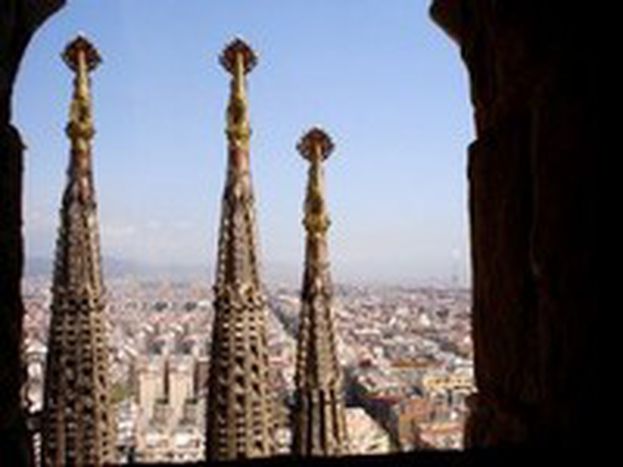
Livin' la vida loca
Published on
Translation by:
 lucy collins
lucy collins
Has northern Europe decided to fall into step with its southern neighbours? One thing is sure, in matters of fashion, lifestyle and cinema, the Iberian Peninsula is la mode.
Ole! The ambience of a Spanish inn. The kitsch décor of a tapas bar with the unmistakable sound of salsa playing in the background. The kitchen door, constantly swinging to and fro allows Juan, our waiter, to pass through. Tonight the place is packed. On the menu are the inevitable tapas: patatas bravas, lomo de cerdo y pan con tomate ... Where am I? Paris, 1,300km from Madrid and its Paseo de la Castellana, where the best tapas on the Iberian Peninsula can be sampled.
A new El Dorado?
The fact is that Iberians are everywhere; they have even invaded the big screen and the radio waves. In cinema they go by the names of Alejandro Amenabar, Almodovar and Penelope Cruz; and in music, Mecano, Julio Iglesias and Las Ketchup.. A closer look reveals that they can even be found in our wardrobes with brands such as Zara and Mango. With more than 500 stores located in 36 countries around the world, Zara, launched in 1975, is at the top of its game and currently the World’s third largest high street clothing retailer.
Jose Jimenez, the director of the Cervantes Institute in Paris, puts this down to the Spanish talent for establishing informal relationships and drawing inspiration from cross-culturalism. After stating that “dining together is not just about eating, it is also, above all, about being with others,” he added that the Spanish know how to work and play hard. Jimenez speaks of a “mutual exchange” when discussing the subject of the EU and Spain’s accession in 1986. Europe brought a democratic culture to his country, while Spain played a catalytic role in constructing a cultural Europe, as it “risked being purely bureaucratic.”
Likewise, there has been an undeniable realisation of Spain’s potential, particularly in the domain of tourism. With 53.6 million foreign tourists visiting in 2004 and a 3.4% annual increase in this figure, according to Statistics from Exceltur, a union of the country’s leading tour agencies, Spain is the second most visited country in the World. Catalonia, the Canary Islands and Balearic Islands remain the most frequented destinations, particularly by Northern Europeans. It is no coincidence, then, that Majorca has been named the ‘17th Bundesland’ by some of its European neighbours. Since its renaissance following the 1992 Olympic Games, Barcelona has benefited from a subsequent surge in interest and manifest cosmopolitanism, as foreigners now comprise more than 10% of its population.
Artistic Boom
In addition, the director of the Cervantes Institute states, but not without allowing a smile to cross his face, that Spanish culture can no longer simply be reduced to the writer Federico Garcia Lorca. He considers that the fall of the Franco regime sparked a cultural explosion. The Spanish were aspiring to freedom, tolerance and free expression. The Movida cultural movement, which was spawned in the 1980s in Madrid and then gradually extended throughout the country, remains the definitive historical reference when broaching the subject. As a process of democratisation and liberalisation that characterised the end of the Franco dictatorship, it was influenced by European cultural movements such as the British New Wave and the punk movement and translates as an unprecedented artistic effervescence. Jose Jimenez even reminisces of a veritable “process of recuperation”, with films by Pedro Almodovar and pop music gaining widespread popularity. Dining late, Flamenco, the legendary siesta or bull running … are these cultural activities really exportable to other EU countries? Jimenez claims: “we are heading towards a more global society. Personally, I feel like a nomad, a World citizen. There are habits, but not impossibilities.”
If Spain traditionally finds itself in the limelight, Portugal has come to claim its share of the pie. Just like its neighbour, Portugal benefited from the fall of the Salazar military dictatorship. Its accession to the EU caused the discovery of Portuguese culture to accelerate. Take a hint of Fado and mix in a few of Portugal’s great singers: Amalia Rodrigues, Madredeus or Mariza. Add the undeniable capacity for self-promotion by organising large sporting or cultural events such as Expo ’98 and Euro 2002. Sprinkle in a few well-known politicians: Barroso, the current President of the European Commission, is Portuguese. Finish with a pinch of literature: Pessoa, Jose Saramago – the 1998 Nobel Prize for Literature laureate. All that remains is for you to sample it. Portugal and Spain have confirmed themselves as major contributors to the European cultural scene and have already appointed their ambassadors.
Translated from Fièvre latino


